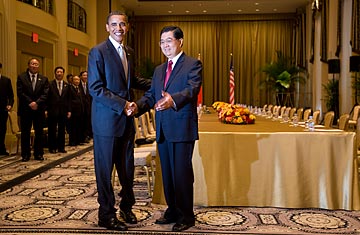
President Obama meets with Chinese President Hu Jintao.
As Barack Obama embarks on his first trip to Asia as President, he has the luxury of a largely united group of aides to guide him through the diplomatic and economic issues that have characterized U.S.-Asian relations for more than a decade: claims of unfair trade practices between the U.S. and China and Japan, the ongoing crisis of a potentially nuclear North Korea, the challenge of how to best address climate change and the fate of U.S. military bases in Japan.
If there is little expectation of dramatic breakthroughs on any of those issues, there is consensus among Obama's advisers on the general approaches to follow. On most trade questions, the position of the Obama Administration remains the same as that of its predecessor: polite pressure. On some security issues, however, the U.S. has moved more in line with the preferences of its Asian allies, like reopening bilateral dialogue with North Korea and direct talks with Burma. There have been few disputes among Obama's team on the correct position on any of these issues.
That may be because some have worked together for years, both in and out of government. Typically for this Administration, all have strong academic backgrounds and tend to be wonks, more comfortable talking policy behind the scenes than making speeches. In a break for an Administration known for a White House–controlled foreign policy, the State Department plays heavily in strategy and policy implementation on Asia, which has helped create comity between the two centers of power.
Obama's closest Asia hand is Jeffrey Bader, the President's senior Asia director at the National Security Council. Bader is the one to brief him in the West Wing during the day, to coordinate the agencies in policy formation, and to stand by when Obama takes or makes calls to leaders. Bader spent 27 years in government as a career foreign-service officer focusing on China and trade. Bader came to the Administration from the Brookings Institution, where he had been hired by James Steinberg, now Deputy Secretary of State.
Secretary of State Hillary Clinton is on Obama's trip and can rightly claim that her department is a key player on policy in this part of the world. That policy weight comes from Steinberg, a China expert and former Deputy National Security Adviser who is staying in Washington during the trip. He has been largely responsible for designing the Administration's approach to Asia, which is to focus on reassuring both long-term allies and China that the U.S. seeks increased cooperation in areas of shared interest. Kurt Campbell, a centrist Clinton White House and Pentagon official, will have the point position when it comes to briefing the President on upcoming meetings and issues during the trip. He and Bader have a good relationship.
On economic affairs, Obama leans on Timothy Geithner, the Treasury Secretary. Geithner has personal history in Asia, having studied China and Japan in college and graduate school before shifting to economics, eventually rising to become Under Secretary of the Treasury for International Affairs in Clinton's second term. As the Bush Administration did throughout the dollar's slide, Geithner recently declared the importance of a strong dollar, even as it has continued to fall. Asian countries have huge dollar reserves and are skittish about the future of their holdings. Obama will attempt to bolster their belief in the currency's stability.
Michael Froman, Obama's Deputy National Security Adviser for Economic Affairs, and Thomas Donilon, his principal Deputy National Security Adviser, will both be in the picture on economic and national-security issues, especially regarding the prospect of North Korean talks — or potential sanctions should those talks fail and relations with the Hermit Kingdom erode further.
